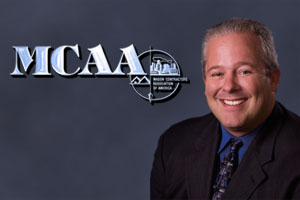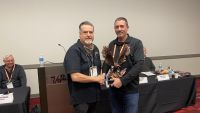Q&A with Jeff Buczkiewicz
By Masonry

On July 2, 2007, Jeff Buczkiewicz became the new executive director of the Mason Contractors Association of America (MCAA). Masonry recently spoke with Buczkiewicz about his thoughts, goals and aspirations for the Association.
Masonry: First off, tell us a little more about your history prior to becoming the executive director of MCAA.
Buczkiewicz: Well, I have a degree in political science from Northern Illinois University, with a dual emphasis on international relations and public administration. I entered the masonry industry as director of marketing and membership with MCAA 10 years ago, and was in that position for six years. I left MCAA to become the executive vice president for the Building Stone Institute (BSI). I was with them for about four years.
When I was with BSI, we worked collaboratively with a lot of other organizations. Fortunately, I was involved with some boards and groups that took part in a lot of joint work in the industry. I got to see how other groups operated; it was a nice experience to see how some things work and some things did not.
Being on the supplier side gives me a different perspective with regards to how the suppliers feel about the collaborative things that MCAA is proposing. It gave me a whole different perspective and, hopefully, a different angle as to how I can work with the suppliers in the future within our organization.
Masonry: And you're going to be working hand-in-hand with the suppliers and BSI quite a bit in the future.
Buczkiewicz: Yes, I would like to work more hand-in-hand with a lot of organizations, not just with the BSI.
I think I have a different perspective and I understand their perspectives. In the past, these organizations were kind of told, 'You guys really need to be involved with us, but we're going to decide how to do this.' I really feel that we need to have a different approach, and that we need to give them a spot at the table and ask them what they feel we need to do as an organization for their particular material. What do we need to do for stone? What do we need to do for brick and block? How can we facilitate the workforce development, and how can we teach our members things that suppliers want them to know? They are selling the materials and supplies, they know advances and technologies that are coming down the pipeline, and they'd be a great source for providing educational opportunities.
Our approach is going to be completely different. MCAA will be looking to the suppliers to provide information to us regarding their specific products and where they think we need to work on a variety of different areas – such as training, educating, promoting, etc. – for their products. The MCAA will act as a conduit for the masonry industry and the clearinghouse for the training and education. We will put together what all the suppliers are proposing and provide a systems approach to our training, education and promotion. Ultimately, this is how it works in the real world; the contractors purchase supplies from a variety of masonry suppliers and then we put the system together.
Masonry: So you've put a little bit of thought into this have you?
Buczkiewicz: (Laughs) Yes, just a little bit. I've put a lot of thought into it over the years. The industry is and has been very segmented.
For instance, if you're with the brick suppliers, they have a limited amount of marketing budget and education resources that they can apply, and they want to see all of that go toward brick education and training. It's not fair for us, the mason contractors, to say 'You have to look bigger and beyond the scope. This is what you should do.' I think it's fair to say 'Let's work with you and within your means. Tell us what you're looking for and we'll help put that together with the other segments of the industry.' The contractor becomes a conduit for the training, education and some promotional efforts.
Masonry: What are your thoughts about the masonry industry's current position?
Buczkiewicz: It has taken a little bit of a hit over the past few years. I think that we're perceived as being a complex system and that one glitch can create problems for the entire job. Will there be workforce issues? Will there be training issues? There have been a lot of different things that have come up, some warranted and some not, but these problems have become a stigma, which is based more on perception rather than reality. So, I feel that our current position is a little weaker than it was a few years ago.
However, I have been involved in several studies that found masonry materials in general are still the preferred material by the end user. So I think that we're in a very enviable position. To have been through what we have over the past few years and still be in that type of situation is a tremendous asset. I think that we just need to start reshaping the image of the industry and perception of it, we need to address some of those complexities that exist out there, and we need to redefine them. Sadly, perception is reality, and we need to work on that perception and have it fall more in line with what truly is out there.
Masonry: Do you feel that MCAA's role in the industry will change in the future?
Buczkiewicz: I think the role will change rather dramatically in the future. I see us being a national leader and trying to redefine masonry at that level.
We need to look at why people have possibly chosen not to use masonry in the past and turn those reasons upside down. And we need to simplify the process for users. The design community is looking for the systems approach. In order to regain market share, we need to unify and have a direct source for masonry systems. It will be very tough to compete in today's world as independent systems. But we're making some strides in that direction.
I also feel that, as a national organization, we need to solidify some relationships with state and local groups and build upon them. Each segment and each local marketplace has its own issues to deal with. As a national organization, we obviously can't address all of those specific needs; they are different from place to place. We need to be there to help support them on a wider scale, but we also need them, at the local level, to support us as an organization, as well as on some of the more complex national issues.
So, in the future, I think you'll see us more as a facilitator, building relationships and creating a simplified systems approach to masonry.
Masonry: What priorities are you focusing MCAA's efforts on during the next year?
Buczkiewicz: I can tell you that our highest priorities, in a broad sense, are marketing, legislative issues, codes and standards, MCAA membership and workforce development. Obviously, those are our core issues that we're always going to focus on.
In addition, I think in the next year that we need to focus a little more on redefining ourselves as an organization. A process such as that will really take 12 months to go through and take an honest evaluation of the organization, to see what our resources are, see what we're doing well, and even some of the things that we aren't doing as well.
Masonry: Any long-term goals for the Association?
Buczkiewicz: We talked earlier about building relationships with the supplier community and our chapter network, and that will be key to the long-term impact of the MCAA. We want to build a solid foundation, because that solid base will allow everything you build from the ground up to be successful. The suppliers and chapters not only need to feel included, but they need to be included in that process. And I think that's going to be the big difference that people are going to see long-term: That we're not only talking about getting people involved, but we're actually getting them involved in the organization.
I'm not saying that everyone can be on the board or a committee chair, but people should feel free to call us and say 'You know what? I don't think you're doing something right here.' Or 'Hey, this has come up in our area and we need you to take a look at it.'
We want our membership, even the non-members, to feel that they can call or drop us an e-mail any time so that they have that communication flow with us. That's going to be key to our growth and success as an organization.
Masonry: If you had one request to make of MCAA members, what would it be?
Buczkiewicz: I would actually have two requests. I think both of them are pretty important, and I kind of touched upon one during one of the last questions. The two things that I would ask our members to do is to be patient and be involved.
Don't expect dramatic changes overnight. I think people will start seeing development within the first six months, but I think the 12-month marker will be a much better barometer of where we are as an organization and how we are going to continue to develop and evolve over the next few years. Being patient during this time period is very important. Be patient with us and you will see things develop. There are a lot of things that the Board and I are looking at; there are going to be substantial changes, and I think everybody is going to be quite pleased with the results.
The other thing is for people to be involved. It doesn't have to be huge. Call us, drop us an e-mail when you have an idea, when you think we're doing something right or wrong – we need to hear from you. This is your Association and we need your input.
Everything that I've said for members applies to non-members as well. We're the national organization for mason contractors, whether you're members of our organization or not. Obviously, we would love your support as it makes things a lot easier on us to represent you more effectively but, regardless of your support, we still represent you in a variety of ways that have a dramatic effect on your business.
I would love for non-members to be involved and talk with us about their concerns. If they would get involved with MCAA, I think they would see the value that is available from our organization and they might decide 'Hey, this is a group that I should be supporting.'
Masonry: If you had to choose, what is the one thing you are looking forward to over the next year?
Buczkiewicz: The one thing I'm really looking forward to doing is implementing tangible benefits for our members.
There are a lot of intangible MCAA benefits, such as the work MCAA completes in the marketing area. The marketplace will build and you may or may not see a direct benefit from that work, but the industry as a whole will receive a benefit. Tangible benefits are things that the members will receive a direct return for their involvement.
For tangible benefits, this year MCAA is looking to implement a national workers' compensation program. Anyone who participates in the program will hopefully see a direct savings to their bottom line by being involved with us as an organization and by utilizing that program. So they will actually be able to save a certain amount by being a member of the MCAA.
Another thing that will help is the MCAA National Mason Contractor Certification program. That could be considered a tangible benefit as well. By being a certified mason contractor, it could open doors for you to bid on projects that you may not have been able to bid on before.
I'm looking forward to implementing these tangible benefits and to see the effect that it will have on our membership growth.
Masonry: Do you have any final comments to add?
Buczkiewicz: I would like to stress that the communication and openness of the prospective members and those in our membership is very important. MCAA is their organization, whether they're members or not. I'm just here to lead the Association and send it in the direction that they want it to go. Without input, I'm kind of like a captain of a ship without a map; they're the ones that help provide the direction for us.
About the Author
Masonry, the official publication of the Mason Contractors Association of America, covers every aspect of the mason contractor profession - equipment and techniques, building codes and standards, business planning, promoting your business, legal issues and more. Read or subscribe to Masonry magazine at www.masonrymagazine.com.


















